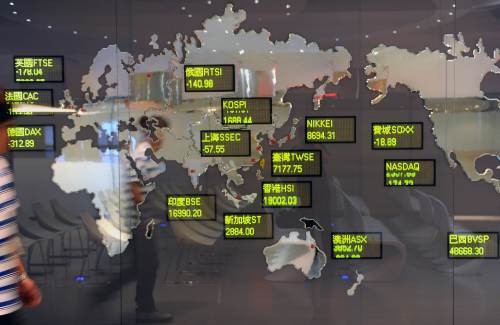Market crashes while officials try to soothe investors
Seoul stocks continued to drop, hitting a 13-month low Tuesday as institutional investors shunned local shares on fears that Asia’s fourth-largest economy could be hit hard by the historic debt crises in the U.S. and Europe.
The KOSPI dipped as low as 9 percent, dropping below the 1,700-level within the first two hours of trading driven by foreign investors’ selling spree before surging back to 1,801.35, ending on a daily loss of 3.6 percent. It is the index’s lowest close since Sept. 9 of last year.
The junior KOSDAQ closed at 432.88, down 29.81 points, or 6.44 percent, after plummeting 10 percent in the morning.
The local currency lost 0.52, or 5.6 won to close at 1088.1 against greenback, after trading at a narrow range between 1,096 and 1,088.
The Korea Exchange halted program trading on the KOSPI and KOSDAQ for a second day after both indexes dived nearly 10 percent at around 10:30 a.m. local time.
“Investors, especially foreign retailers, are concerned that Korea would be one of the hardest hit should the U.S. sovereign rating cut lead to a double dip,” Kim Jung-hoon, a strategist at Korea Investment & Securities said.
Seoul stocks continued to drop, hitting a 13-month low Tuesday as institutional investors shunned local shares on fears that Asia’s fourth-largest economy could be hit hard by the historic debt crises in the U.S. and Europe.
The KOSPI dipped as low as 9 percent, dropping below the 1,700-level within the first two hours of trading driven by foreign investors’ selling spree before surging back to 1,801.35, ending on a daily loss of 3.6 percent. It is the index’s lowest close since Sept. 9 of last year.
The junior KOSDAQ closed at 432.88, down 29.81 points, or 6.44 percent, after plummeting 10 percent in the morning.
The local currency lost 0.52, or 5.6 won to close at 1088.1 against greenback, after trading at a narrow range between 1,096 and 1,088.
The Korea Exchange halted program trading on the KOSPI and KOSDAQ for a second day after both indexes dived nearly 10 percent at around 10:30 a.m. local time.
“Investors, especially foreign retailers, are concerned that Korea would be one of the hardest hit should the U.S. sovereign rating cut lead to a double dip,” Kim Jung-hoon, a strategist at Korea Investment & Securities said.

Global equities plunged after credit rating agency Standard & Poor’s downgraded U.S. debt rating from “AAA” to “AA+” at the end of last week. Fannie Mae and Freddie Mac, the state-controlled mortgage agencies in the U.S., were also downgraded Monday by the agency.
The KOSPI recovered after hitting as low as 1,690 as the National Pension Service, the nation’s biggest investor, began to scoop up the blue chips thrown out by foreign investors.
But Korea’s risk hit its highest level in eight months. The Credit Default Swap premium of five-year foreign currency bonds, a risk premium for the sovereign debt of a country, widened to 136, its second-highest level ever since climbing as high as 319 at the end of 2008.
Policymakers at the Finance Ministry, the Financial Services Commission and the central bank continued to express confidence in the economy’s resilience, backed by ample foreign reserves.
Choi Jong-ku, deputy minister for international affairs at the Finance Ministry, held a press briefing right after the market close to stress the sound fundamentals of the economy.
“Foreign investors sold more than 1.2 trillion won in stocks from Seoul markets in the past two days but it the currency market remained relatively stable, meaning foreign capital hasn’t exited the local market yet,” he told reporters in Gwacheon Government Complex, south of Seoul.
“The market fall may seem similar to the crisis we had in 2008 but this time it is really different, and the market will post a sharp rebound,” a Finance Ministry official said.
Korea has accumulated more than $300 billion in foreign exchange reserves, the seventh largest in size, which it uses to stabilize the won against a basket of major trading currencies in times of sharp fluctuations.
Investors around the world continued their withdrawal from stocks even as U.S. President Barack Obama expressed his confidence in the country’s credit rating, saying the U.S. “always will be an AAA country.”
By Cynthia J. Kim (cynthiak@heraldcorp.com)



![[AtoZ into Korean mind] Humor in Korea: Navigating the line between what's funny and not](http://res.heraldm.com/phpwas/restmb_idxmake.php?idx=644&simg=/content/image/2024/04/22/20240422050642_0.jpg&u=)


![[Herald Interview] Why Toss invited hackers to penetrate its system](http://res.heraldm.com/phpwas/restmb_idxmake.php?idx=644&simg=/content/image/2024/04/22/20240422050569_0.jpg&u=20240422150649)
![[Graphic News] 77% of young Koreans still financially dependent](http://res.heraldm.com/phpwas/restmb_idxmake.php?idx=644&simg=/content/image/2024/04/22/20240422050762_0.gif&u=)
![[Exclusive] Korean military set to ban iPhones over 'security' concerns](http://res.heraldm.com/phpwas/restmb_idxmake.php?idx=644&simg=/content/image/2024/04/23/20240423050599_0.jpg&u=20240423183955)






![[Exclusive] Korean military to ban iPhones over security issues](http://res.heraldm.com/phpwas/restmb_idxmake.php?idx=652&simg=/content/image/2024/04/23/20240423050599_0.jpg&u=20240423183955)



![[Today’s K-pop] Ateez confirms US tour details](http://res.heraldm.com/phpwas/restmb_idxmake.php?idx=642&simg=/content/image/2024/04/23/20240423050700_0.jpg&u=)